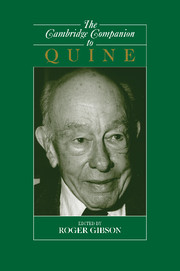Book contents
- Frontmatter
- Willard Van Orman Quine
- 1 Aspects of Quine’s Naturalized Epistemology
- 2 Quine on the Intelligibility and Relevance of Analyticity
- 3 Quine’s Meaning Holisms
- 4 Underdetermination of Physical Theory
- 5 Quine on Reference and Ontology
- 6 Indeterminacy of Translation
- 7 Quine’s Behaviorism cum Empiricism
- 8 Quine on Modality
- 9 Quine and Logical Positivism
- 10 Quine and Logic
- 11 Quine on Quine
- Selected Bibliography
- Index
Willard Van Orman Quine
Published online by Cambridge University Press: 28 May 2006
- Frontmatter
- Willard Van Orman Quine
- 1 Aspects of Quine’s Naturalized Epistemology
- 2 Quine on the Intelligibility and Relevance of Analyticity
- 3 Quine’s Meaning Holisms
- 4 Underdetermination of Physical Theory
- 5 Quine on Reference and Ontology
- 6 Indeterminacy of Translation
- 7 Quine’s Behaviorism cum Empiricism
- 8 Quine on Modality
- 9 Quine and Logical Positivism
- 10 Quine and Logic
- 11 Quine on Quine
- Selected Bibliography
- Index
Summary
Willard Van Orman Quine was born in Akron, Ohio, on June 25, 1908. His father, Cloyd Robert Quine, was an Akron businessman with a machine shop background. In 1917, Cloyd Quine founded the Akron Equipment Company, whose business was the manufacture of tire molds. The business flourished, what with Akron being then the rubber tire capital of the world. Willard’s mother, Harriet Ellis Van Orman, was a housewife and public school teacher who taught at a local elementary school for ten years. In his autobiography Quine fondly recalls his mother’s culinary skills:
My mother baked bread and rolls in my early years and the smell beckoned. She was also good at pies, cakes, and strawberry shortcake. She made jelly from the fruit of our little quince tree, and she made cherry sunshine by the heat of the sun.
(TL 12)Harriet Quine considered herself to be deeply religious, and in her later life she became a deaconess in the Congregational Church. The religious training of Willard and his only sibling, Robert Cloyd Quine, a year and a half his senior, consisted of their being “sent to Sunday school about half the time, and seldom sent to church” (TL 14). However, the more Willard was exposed to the Word, the more skeptical he became:
I may have been nine when I began to worry bout the absurdity of heaven and eternal life, and about the jeopardy that I was incurring by those evil doubts. Presently I recognized that the jeopardy was illusory if the doubts were right. My somber conclusion was nonetheless disappointing, but I rested with it. I said nothing of this to my parents, but I did harangue one or another of my little friends, and I vaguely remember a parental repercussion. Such, then, was the dim beginning of my philosophical concern. Perhaps the same is true of the majority of philosophers.
(TL 14)- Type
- Chapter
- Information
- The Cambridge Companion to Quine , pp. 1 - 18Publisher: Cambridge University PressPrint publication year: 2004
- 3
- Cited by



